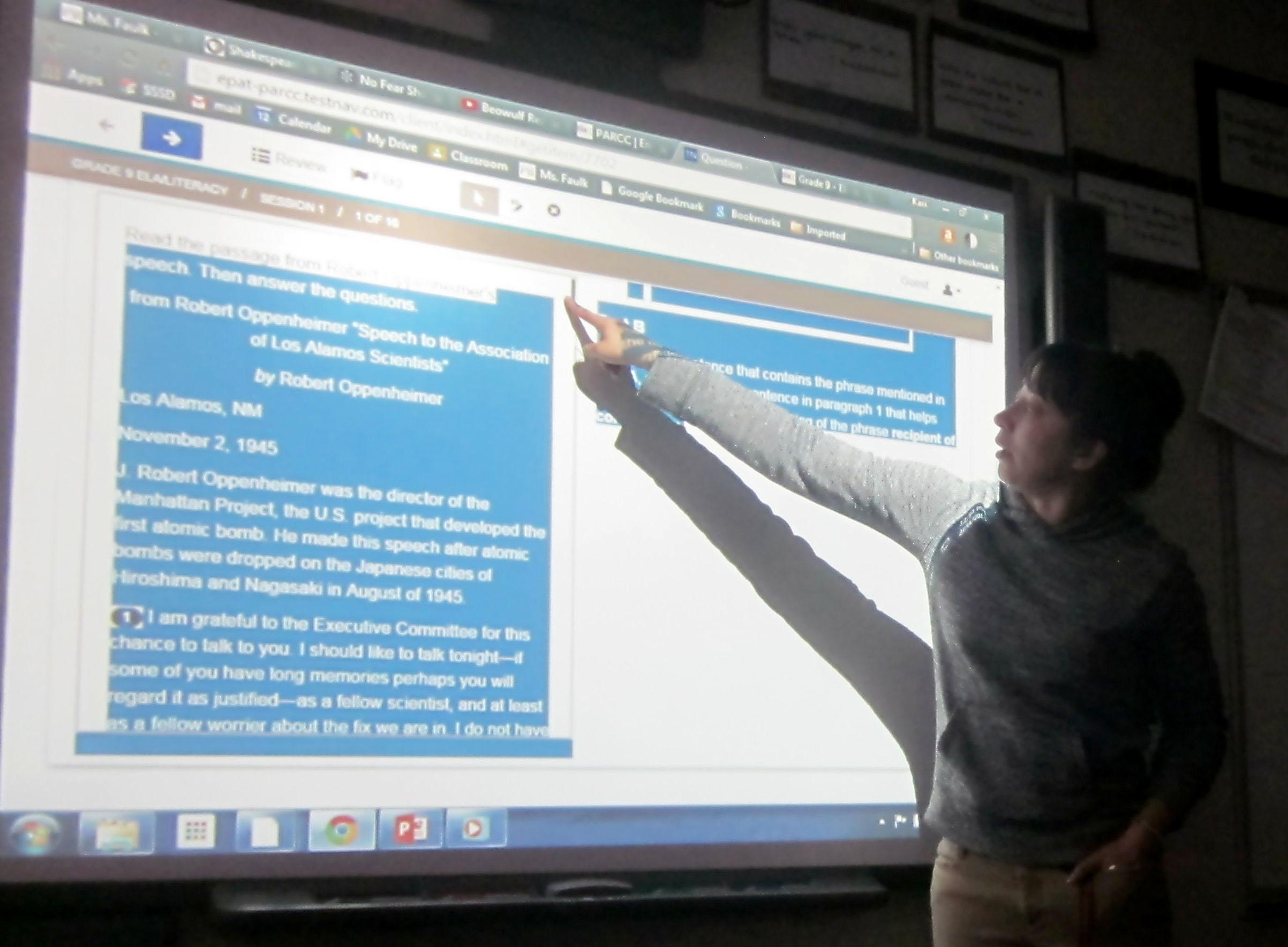
This week, hundreds of thousands of Colorado school children are taking the first-ever statewide online tests for grades 3-11 called PARCC.
The acronym stands for Partnership for Assessment of Readiness for College and Careers. The tests replace the old Colorado Student Assessment Program. Earlier this year 20 school districts asked for waivers from this first part of PARCC (the second set of tests takes place in May.) They didn’t get them. Colorado’s attorney general said the state department of education didn’t have the authority to do that.
Steamboat Springs School District was one of the 20 districts that asked for a waiver. Officials knew they wouldn’t get one but they believed it was important to send a political statement that it’s time for the state to review how the testing system functions.
"Nobody is suggesting we don’t want accountability. Nobody is suggesting that we don’t want to know how our kids are doing. No one is suggesting that we don’t want to know how are kids are doing compared to the state and the nation, so there is a level of testing that is absolutely required," said Roger Good, chair of the district’s school board. "The challenge is, maybe the pendulum has swung too far towards the testing side and not enough towards the education side."
For Steamboat Springs, officials say, that pendulum has swung too far.
What’s the problem?
There are two pieces of paper Marty Lamansky reads from that sum up why his district asked for a waiver from testing. The first sheet, which is actually two pages long, lists all the tests students in the district must take, like the ACT, Advanced Placement tests, CogAT (a 2nd grade reading screening test) and MAPs tests.

"When you looked at it all together, you thought, this is an awful lot of standardized assessments," says Lamansky, the district’s director of testing and assessment. "At some point, adding another standardized assessment doesn’t really give you more information."
Lamansky pulls out another sheet of paper. It’s a chart called "When do Top Performing Countries Test Students." It shows Canada for example, tests in Grades 3, 6, 9, with one test in grade 10. Japan does a diagnostic math test in 6th and 9th grades. And Finland, one of the highest performing countries in the world, doesn’t have an exam until the end of high school.
"[Research] has shown testing doesn’t necessarily improve performance," Lamansky says.
"Our other frustration is we are a high-performing district. There’s no flexibility whatsoever, whether you’re a big district, a small district, a high-performing district, a district that has a pocket that needs to be addressed. It’s the same thing for everybody. That’s just not necessarily something that is good for kids or the system."
The U.S. meanwhile, has tests in nearly every grade. And Colorado has added tests beyond what’s required by federal law.
- Take a sample PARCC test
- 2014 - 2015 testing dates for Colorado students
- Quick reference on all federal and Colorado assessments
Tests take resources
Lamansky describes the situation like a dinner plate and the state has added "serving upon serving upon serving" such that the plate’s now overflowing.
"At some point you have to take some things off the plate," he says. "You are thoughtful about what’s repetitive and redundant, what’s useful, what’s not useful for the various purposes."
Lamansky and other administrators worry testing is chipping into the time teachers have to work with their students. He says testing is also consuming a lot of administrator time. Assistant principals specifically, have spent hours working on testing logistics and learning new computer programs to manage those logistics.
Meeting the mandate
One reason testing may go easier in Steamboat than many rural districts is because of the district’s technology director Tim Miles. He’s the guy who has had to make sure every kid has a working computer to take the PARCC tests.

Last summer, administrators asked Miles what was keeping him awake at night when he thought of the new school year.
He replied it was state testing. "And that was in August," he says.
The first set of PARCC tests wouldn’t happen until seven months later in March.
"And they said, ‘really Tim?’" Miles recalls. "I said, "really, because you principals haven’t thought of it like me. I know how many computers we have and I know how many students we have. To try to fit those kids through that bottleneck we’re not going to be successful.’"
The "bottleneck" he’s referring to is the state’s testing window. Districts must run all students through the tests sometime between March 9 and April 3.
Before, kids took the test with paper and pencils at their desks. Thousands of cash-strapped schools in Colorado don’t have computers in every classroom so testing time has become a complicated dance to make sure every kid has access.
Miles checked area hotels and the local college to see about bussing kids there to take tests. Those options presented problems. So Miles convinced administrators -- to meet the testing mandate -- they needed to invest half a million dollars to upgrade the system, including 600 plus new computers. Steamboat dipped into reserves to make that happen.
"Depleting reserves when it’s a mandate from the state takes local decision making out of what could have been a higher priority," says school board chair Roger Good. "There’s a little bit of frustration with someone coming from out of town telling us how to spend our money."
Buffering teachers and students
School district administrators have made a concerted effort to buffer students and teachers from the stress of testing.

When asked about PARCC a couple of weeks ago, 9th grade English students at Steamboat High hadn’t heard of it until that day, when their teacher Kari Faulk introduced it. She explains that they’ll take three hours of tests for English.
There are a few groans. But the students listen intently. They have a lot of questions. Why is it computerized? Why is it harder? Will it count towards their grade?
Faulk tells them the tests are purely informative.
"This is the data we use to help us teach better," she explains.
Faulk answers every question, framing her answers positively, trying to reduce their fear.
The class goes over a sample question. Then the students ask Faulk which test she prefers, PARCC or the old CSAP test.
She considers and then answers "PARCC" because it’s more creative and integrates reading and writing skills.
"It does seem more authentic to me," Faulk says. "The TCAP and CSAP (older tests) seemed very fragmented, it was very skill by skill, this question addresses this skill, this question addresses that skill and that’s not how we teach and that’s not how they learn and perform in our classroom. So the way the questions are designed and the way the skills are integrated (in the new online test) just seems more authentic to me."
Still nervous
Virtually all of the students in Faulk’s class say they’re nervous about this test being online. Several are afraid the computers will crash.
"It kind of gives me a headache staring at a screen for that long, and last year I took an online test and it crashed and it took me five times longer," says Annika Fahrner.
She makes the point that it’s recommended that teens limit their on-screen time to 2 hours a day. So why are they taking 3 hours of tests in one day, she wonders.
Another student says she prefers taking tests online.
"Because I’m faster at typing than writing and whenever I write by hand my hand cramps up. So I mean, it’s nice that we can type," says Lana Pivarnik.
Even though the tests don’t count towards their grade, students say all the regulations and talk around taking the test make it seem like a really big deal. Student Henry Tisch says that causes stress.
"My parents want me to do well. So even if it’s a test I’m not getting graded on, if they see that I did poorly, they’ll be disappointed," Tisch says. "It’s also reflecting back on your teachers. If you don’t try very hard, it’s making it seem like they’re the bad ones."
Faulk herself doesn’t agree with the criticism that the tests take too much class time. She says other teachers might feel differently. Faulk, a self-described data nerd, believes state tests actually give teachers useful feedback on curriculum.
"At the end of the day, do I lose that much time?" she asks. "Probably not. Do they affect my students’ grades or college admittance? No. There’s a contrast between how we discuss it and how we stress about them and the actual reality of how they play out in our lives."
Steamboat High principal Kevin Taulman, isn’t so sure. Testing isn’t over with this month’s PARCC. There’s another set of PARCC in May, along with Advanced Placement (AP) tests.
"I think come May our teachers are going to feel it," Taulman says. "When they come back from our spring break at the end of April, and we have two weeks of AP testing and the same window is going to be three weeks of PARCC testing, they’re going to look up and go, ‘we’ve just assessed our kids the entire month of May.’"
Steamboat students begin taking the PARCC tests next week.








